Related Research Articles

Hollywood Squares is an American game show in which two contestants compete in a game of tic-tac-toe to win cash and prizes. The show piloted on NBC in 1965 and the regular series debuted in 1966 on the same network. The board for the game is a 3 × 3 vertical stack of open-faced cubes, each occupied by a celebrity seated at a desk and facing the contestants. The stars are asked questions by the host and the contestants judge the truth of their answers to gain squares in the right pattern to win the game.
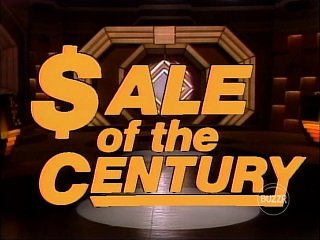
Sale of the Century is an American television game show that originally debuted on September 29, 1969, on NBC daytime. It was one of three NBC game shows to premiere on that date, the other two being the short-lived game shows Letters to Laugh-In and Name Droppers. The series aired until July 13, 1973, and a weekly syndicated series began that fall and ran for one season.
The Joker's Wild is an American television game show that aired at different times between 1972 and 2019. In the show, contestants answer questions based on categories determined randomly by a mechanism resembling a slot machine. The show's title refers to the game's slot-machine mechanism also having jokers.

Chain Reaction is an American television game show created by Bob Stewart, in which players compete to form chains composed of two-word phrases.
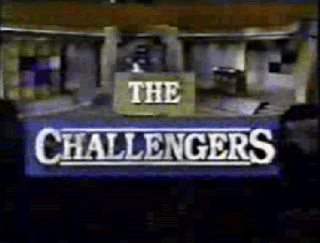
The Challengers is an American game show that aired in syndication from September 3, 1990, until August 30, 1991. The show remained in production for its entire run on the air, differing from most syndicated game shows which usually wrapped in the early summer.
Idiot Savants was an American television game show on the MTV network which ran from December 9, 1996, to April 25, 1997. It was created by Michael Dugan and Chris Kreski, directed by Steve Paley, and hosted by comedian Greg Fitzsimmons.

Jackpot is an American and Canadian television game show produced by Bob Stewart which saw contestants attempting to solve riddles in order to win cash and prizes.

Game Ka Na Ba?, formerly Pilipinas Game Ka Na Ba is a Philippine game show created by ABS-CBN. The main goal of the game is to win 2 million pesos by answering trivia questions.
Shop 'til You Drop is an American game show that was on the air intermittently between 1991 and 2005. Four different series were produced during that time, with the first premiering on Lifetime on July 8, 1991, and the fourth series airing its final episode on May 27, 2005, on PAX TV.
Sale of the Century is an Australian prime time game show that aired on the Nine Network from 14 July 1980 to 29 November 2001. It is based on both Great Temptation that aired from 1970 to 1974 and on the original Sale that first aired in the United States from 1969 to 1973. The Australian format of Sale has since been used internationally, including in a revived US version that aired from 1983 to 1989.
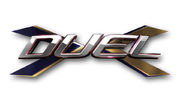
Duel is an American game show hosted by Mike Greenberg that first aired from December 17 to December 23, 2007 on ABC. The show aired as a week-long six-episode tournament at 8:00 p.m. from Monday through Friday with the finale on Sunday.

Break the Bank is an American game show created by Jack Barry and Dan Enright and produced by their production company, Barry & Enright Productions. It was the first game show packaged by Barry and Enright as a tandem since their fall from grace following the 1950s quiz show scandals.

Bingo America is an American game show broadcast by Game Show Network. The series follows two contestants as they try to compete to win up to $100,000. Additionally, the series lets at-home viewers print bingo cards online that allow them to play along with the show to win small amounts of money for themselves.
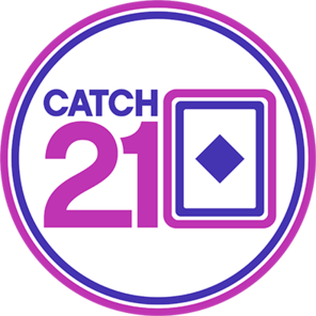
Catch 21 is an American game show broadcast by Game Show Network (GSN). Created by Merrill Heatter, the series follows three contestants as they play a card game centered on blackjack and trivia. The show is based on a popular online game from GSN's website and aired for four seasons from 2008 to 2011. It was hosted by Alfonso Ribeiro, with actress Mikki Padilla serving as the card dealer.
Family Feud was an Australian game show based on the American show of the same name. The program ran on the Nine Network from 1978 to 1984, and on the Seven Network from 1990 to 1996. The program has been revived twice, in 2006 and 2014.
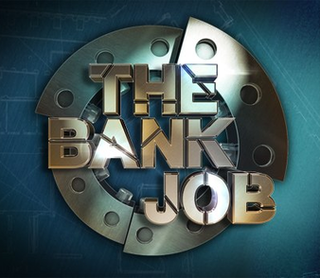
The Bank Job is a British television game show broadcast live on Channel 4, hosted by George Lamb. It was first broadcast on 2 January 2012 and ended on 17 March 2012.
The Biggest Game in Town was a British quiz show that aired on ITV between 10 September and 21 December 2001. The programme was broadcast live and was based on the game of bingo. It was presented by Steve Le Fevre.
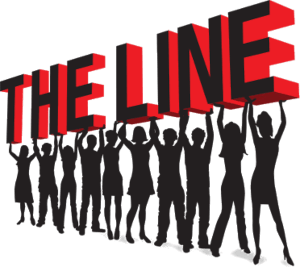
The Line is an American game show pilot co-hosted by Jeff Davis and Candace Bailey. Created by ITV Studios and produced by High Noon Entertainment, the pilot showcased contestants waiting in a "line" to enter a "vault". While in the latter, they must answer a series of eight questions to win a jackpot that grows progressively as contestants fail to answer all eight correctly. While waiting in the line, they may be chosen to perform various challenges. These can earn them additional prizes and/or a move to the front or back of the line. Critical reception for the show was mixed; one writer argued that the show's pace of gameplay was too slow, but was also pleased to see an autistic contestant compete.
Divided is an American television game show broadcast by Game Show Network (GSN) based on the British series of the same name. Each episode consists of four contestants playing as one team who must agree on answers to questions they are given. The longer it takes the team to come to an agreement, the less money the team earns for each question. The series, hosted by Mike Richards, premiered January 19, 2017, and concluded May 8, 2018.

Master Minds is an American game show airing on the Game Show Network. The show debuted on June 10, 2019, under the title Best Ever Trivia Show, hosted by Sherri Shepherd and regularly featuring Ken Jennings, Muffy Marracco, Jonathan Corbblah, Arianna Haut, and Ryan Chaffee. The series was renamed Master Minds on April 6, 2020, with Brooke Burns replacing Shepherd.
References
- ↑ "Game Show Network Starts Year 2000 With a 'Showdown'". 2000-01-20. Retrieved 2018-05-17.
Hollywood Showdown premieres on PAX TV on Monday, Jan. 24, 2000, at 6:30 p.m. ET.
- ↑ ""Hollywood Showdown" Returns". MediaPost. 2000-11-15. Archived from the original on 2018-08-10. Retrieved 2018-05-17.
- ↑ "Game Show Network and TWIN Entertainment Announce Enhanced TV Demo at Cable 2000; Hollywood Showdown to Become Interactive in New Orleans". Business Wire . May 5, 2000. Archived from the original on June 18, 2013. Retrieved July 23, 2021– via The Free Dictionary.
- ↑ "Fans are game for 'Hollywood Showdown'". Pittsburgh Post-Gazette. August 26, 2000. ProQuest 392013068 . Retrieved May 12, 2022.